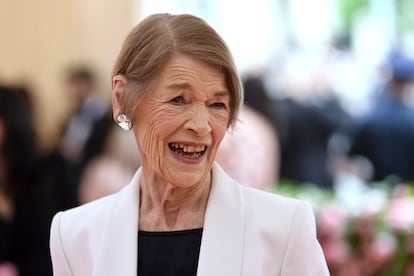Glenda Jackson, British actress and politician, dies at 87
Jackson was one of the biggest British stars of the 1960s and 70s, and won two Academy Awards, for ‘Women in Love’ in 1971 and ‘A Touch of Class’ in 1974

Glenda Jackson, a two-time Academy Award-winning performer who had a second career in politics as a British lawmaker before an acclaimed late-life return to stage and screen, has died at age 87. Jackson’s agent Lionel Larner said she died Thursday at her home in London after a short illness. He said she had recently completed filming The Great Escaper, in which she co-starred with 90-year-old Michael Caine.
Born into a working-class family in 1936 in Birkhenhead, northwest England, Jackson trained at the Royal Academy of Dramatic Art in London. She performed with the Royal Shakespeare Company — where she starred in the cutting-edge drama Marat/Sade directed by Peter Brook — and became one of the biggest British stars of the 1960s and 70s, winning two Academy Awards, for Women in Love in 1971 and A Touch of Class in 1974.
On television, she took home two Emmy Awards in 1972 for her performance as Queen Elizabeth I in Elizabeth R., and secured a place in British pop-culture history by playing Cleopatra in a classic sketch on The Morecambe & Wise Show in 1971. “All men are fools,” she proclaimed in what became a famous one-liner, “and what makes them so is seeing beauty like what I have got.”
In her 50s, Jackson went into politics, winning election to Parliament in 1992. She spent 23 years as a Labour Party lawmaker, serving as a minister for transport in Prime Minister Tony Blair’s first government in 1997.
She came to be at odds with Blair over the 2003 invasion of Iraq. She said Blair’s decision to enter the U.S.-led war without United Nations’ authorization left her “deeply, deeply ashamed.”
“The victims will be as they always are, women, children, the elderly,” she told The Associated Press before the invasion.
Jackson’s blunt manner and outspokenness continued throughout her political career, and may have helped keep her from high government office. After former Conservative Prime Minister Margaret Thatcher died in 2013, she eschewed politeness about the dead to rail in Parliament against the “heinous social, economic and spiritual damage wreaked upon this country” by the late leader.
Jackson returned to acting after leaving Parliament in 2015 and had some of her most acclaimed roles, including the title character in Shakespeare’s King Lear. It opened at London’s Old Vic in 2016 and later played on Broadway.
She had her first film role in a quarter-century in the 2019 movie Elizabeth is Missing. Jackson won a BAFTA award, Britain’s equivalent of an Oscar, for her performance as a woman with Alzheimer’s trying to solve a mystery.
Labour Party leader Keir Starmer said Jackson “leaves a space in our cultural and political life that can never be filled.”
“She played many roles with great distinction, passion and commitment,” he said. “From award-winning actor to campaigner and activist to Labour MP and government minister, Glenda Jackson was always fighting for human rights and social justice.”
Tulip Siddiq, Jackson’s successor as Labour lawmaker for the London seat of Hampstead and Kilburn, said she was “devastated to hear that my predecessor Glenda Jackson has died.”
“A formidable politician, an amazing actress and a very supportive mentor to me. Hampstead and Kilburn will miss you Glenda,” Siddiq wrote on Twitter.
Jackson is survived by her son, Dan Hodges.
Sign up for our weekly newsletter to get more English-language news coverage from EL PAÍS USA Edition
Tu suscripción se está usando en otro dispositivo
¿Quieres añadir otro usuario a tu suscripción?
Si continúas leyendo en este dispositivo, no se podrá leer en el otro.
FlechaTu suscripción se está usando en otro dispositivo y solo puedes acceder a EL PAÍS desde un dispositivo a la vez.
Si quieres compartir tu cuenta, cambia tu suscripción a la modalidad Premium, así podrás añadir otro usuario. Cada uno accederá con su propia cuenta de email, lo que os permitirá personalizar vuestra experiencia en EL PAÍS.
¿Tienes una suscripción de empresa? Accede aquí para contratar más cuentas.
En el caso de no saber quién está usando tu cuenta, te recomendamos cambiar tu contraseña aquí.
Si decides continuar compartiendo tu cuenta, este mensaje se mostrará en tu dispositivo y en el de la otra persona que está usando tu cuenta de forma indefinida, afectando a tu experiencia de lectura. Puedes consultar aquí los términos y condiciones de la suscripción digital.








































